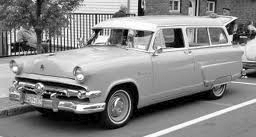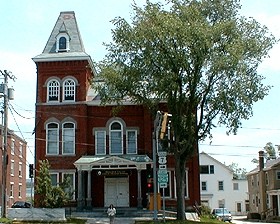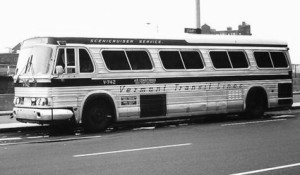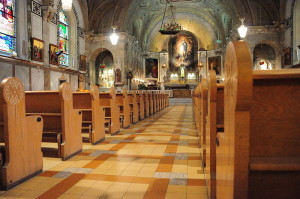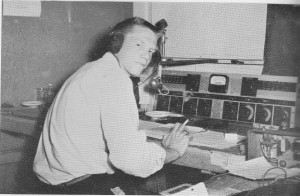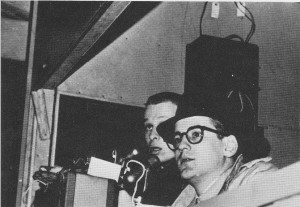Between 1961 and 1963 I was a graduate student at the University of Vermont in Burlington, 36 miles north of Middlebury College where I had just received my BA. Once in a while I drove down in the evening to Middlebury to see friends and to catch one of their psychology seminars. My 1954 Ford station wagon usually made the trip, but one cold winter night in early 1963 when I headed back to Burlington around 12:30 AM, I couldn’t get the car to warm up. The temperature gauge kept rising but only cold air came from the heater vents. I was traveling on US Route 7 in open farmland with nowhere to stop for help when the needle moved into red territory. I thought that I might have to set the car on fire to keep from freezing to death if I couldn’t make it to Vergennes, about 12 miles north of Middlebury. But make it to Vergennes I did and just as I pulled up at a closed service garage, the temperature guage pegged at the top. I set out on foot and banged on the door of the volunteer fire station, where the thermometer on the door read -13F.
No answer there, so I walked up the street and rounded a corner where I found a middle-aged policeman wrestling in the snow with a drunk man and woman, just outside a tavern whose late closing hour was appreciated by many in that part of Vermont. By now It was after 1 a.m.
The policemen turned out to be the chief who had been called out to deal with the unruly couple. Like him, they seemed to be middle aged. I told him my predicament and he agreed to help me with the car if I would help him with the drunks. He managed to get the man into the front seat of his police car and then eased the woman into the back seat with me. Thank God the car was warm. I got a closer look at the couple.. The man seemed be a businessman in his late forties and the dark haired woman might have been a decade younger. For me at age 24 anyone over 35 was middle-aged. I got the impression that the woman wasn’t the wife of the drunk man in the front seat.
The chief drove to a boarding house in Vergennes where the couple might sleep it off, but the proprietor didn’t want to deal with drunks. During this stop the man became abusive, first threatening the officer’s job via influential friends in Montpelier, the state capital, and then cursing him. The policemen had had enough and told them both that they were under arrest. He turned to me in the back seat and said that the nearest jail wasin Middlebury and that we had to drive back there before we could see to my car.
We started back down Route 7 to Middlebury. The officer had to drive with one hand, because the man kept trying to bail out of the car now traveling at over 50 mph. I held on to the woman’s wrist but she didn’t seem as interested in stepping out of the speeding car as her companion did.
At the courthouse in Middlebury we woke up Al Chandler, the sheriff, and his wife. I recognized Chandler because he also served as the College’s police officer. Al and the Vergennes chief tucked the drunk man away for the night in one of the men’s cells and then Al’s wife and the two officers turned to the drunk woman. The women’s cells were upstairs from the kitchen and to reach them you had to negotiate a narrow enclosed staircase. The woman had been docile up to now but put up a huge struggle when they approached the stairway, spreading her arms like a lobster going into the pot when they tried to ease her into the passageway. Eventually they got her into the cell and headed back down to enjoy a cup of hot coffee and to inspect the contents of the couples’ wallet and purse. As it turned out, the businessman came from Montpelier and the woman was from Las Vegas.
Our perusal of their licenses was interrupted by loud banging noises from the women’s cells upstairs; Al’s wife and the chief went back up. The women’s cells were constructed, they told me, of little more than chicken wire, and the woman had just about broken out when they reached her. She went into a more secure cell, we finished our coffee, and the chief and I headed back north to deal with my car.
Back in Vergennes (It was now 3:00 a.m.) the officer woke up the owner of the garage where I had left my car and he came out and filled my radiator with water. These were the days before year-round antifreeze; the sub-zero temperatures were unexpected and he had run out. Incredibly he charged me only $15 for getting up from a dead sleep to send me on my way. He told about an all-night service station in South Burlington where I might get some antifreeze. I stopped there, but they had run out too. The attendant topped off my radiator with water and assured me that the engine block wouldn’t freeze, if I just left it for two or three hours. Back in my apartment in Burlington I slept a little and dealt with the car after sunrise. It was just a leaky radiator hose, this time, but it was the beginning of the end for the 1954 Ford. In March 1963 it spent two weeks in the shop waiting for a special transmission part, and in April, it sprang a major motor oil leak. A three-mile drive from a service station near my apartment to the repair garage consumed four quarts of oil. It was time for the junkyard.
Next week: The Tanker

